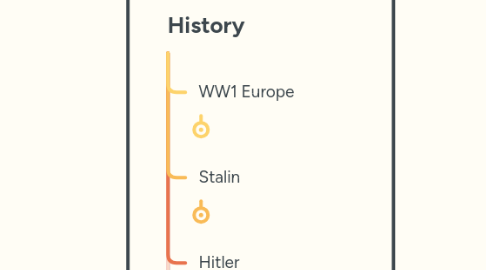
1. WW1 Europe
1.1. TOV
1.1.1. Fair
1.1.1.1. Germany did a number on France in WW1, France exacted revenge through TOV
1.1.2. Unfair
1.1.2.1. War Guilt Clause: Germany forced to accept total blame for causing the war.
1.1.2.2. German military weakness: Harsh limits on armed forces
1.1.2.3. German economic weakness: Shortage of workers, it lost 15% of its male population in WW1, cannot rebuild its economy. France sent its army into the Ruhr industrial region of Germany to confiscate coal and other goods as reperations for WW1. Germany still had to pay reparations for WW1
1.1.2.4. German terrortorial reductions: Lost Rhineland and the Saar coal region. Unable to reunite with Austria to help rebuild their economy.
1.2. LON
1.2.1. Successes
1.2.1.1. Albania: Yugoslavaia tried to take over Albania, League made them withdraw.
1.2.2. Weaknesses
1.2.2.1. Manchuria (JP & China)
1.2.2.1.1. moral pursuasion
1.2.2.1.2. structual inefficiency (Lyntton investigation)
1.2.2.2. Abyssinia (Italy, Brit & france)
1.2.2.2.1. Lack of authority and credibility
1.2.2.2.2. Appeasement & distrust (Secret dealings of war supplies)
2. Stalin
2.1. How he rose to power
2.1.1. Luck
2.1.1.1. Non disclosure of Lenin's testament: Lenin got a stroke and died. He left behind a note that explicitly stated that Stalin should not be trusted to use power wisely, and that he should be removed from his post asap. But, because the testament also contained critisim of all the other Politburo members, the non disclosure of Lenin's testament was unamniously decided.
2.1.1.2. Trotsky's unpopularity in the Politburo: Trotsky was seen as a threat by the other Politburo members as he was the most likely to succeed Lenin.
2.1.1.2.1. Troika was formed (Stalin, Zinoviev, Kamenev)
2.1.2. skill (Stalins manipulations)
2.1.2.1. Pretended to be close to Lenin: - Frequently paid Lenin visits when he was dying - Made himself chief mourner at Lenin's funeral, gave a funeral speech for Lenin - Gave Trotsky wrong funeral date to further discredit him - Ordered to have Lenin's body embalmedand displayed in a mausoleum
2.1.2.2. Role as Secetary General: - Stalin had the power to appoint and re-assign party members - Abused his power to replace Politburo members with his followers to gain more votes - Trotsky now lacked support
2.1.2.3. Exploited ideological divisions: There were 2 divisions in the Politburo, Radicals who formed new ideas and challenged the system and Moderates who stuck closely to Lenin's leadership. Stalin sat on the fence and allied himself with either one of the factions when the time was right, hence he got support from both sides.
2.2. Impacts
2.2.1. Economic
2.2.1.1. Collectivisation (fin 1935): - The merger of several individual farms. The Kulaks (richer peasants) were against this, rebelled by burning and killing their own produce. - Can be viewed as a failure (grain harvest dropped dramatically between 1931-1934. Contributed to the Great Famine 1932-1933)
2.2.1.2. 5 Year Plans: - focused on steel and coal. Even though targets set by Stalin were often not met, the plans helped to propel USSR forward to become an industrial base for a powerful arms industry by 1941
2.2.1.3. 5 Year Plans: - Poor cordination. So much effort was put into the plans, little growth in consumer industries was seen.
2.2.2. Political
2.2.2.1. The Great Terror (1934-1938): Stalin consolidating power. Show trials were conducted.
2.2.2.1.1. Loss of intelectuals: Many smart people were killed or sent to labor camps to prevent opposition. This affected the quality of industrial output, education and other civil services.
2.2.2.2. Propoganda: Stalin was praised in art, books and films. All offices, classrooms and factories were required to have a picture of Stalin. History was rewritten to glorify Stalin and discredit his rivals.
2.2.3. Social
2.2.3.1. State control of society: - Fall in standard of living. The government controlled everything, forced people to live in cramped conditions, often without running water or sanitation. - Famine. Ref to collectivisation economic impact - Lack of consumer goods. The economy was geared towards the production of war resources. Stalin promised more luxuries in the 3rd 5 year plan, but did not fufill.
2.2.3.2. Living in fear: The slightest indication of anti-Stalin behaviour could get you arrested. It would be harder to apply for a house, holiday or jobs if you got on Stalins bad side. Ref to Great terror political impact
3. Hitler
3.1. How he rose to power
3.1.1. Luck (Weimar govt.)
3.1.1.1. Could not solve the issues Germany had (Great depression, Hyperinflation). Germans lost faith and turned to extreme parties to solve the country's problems
3.1.1.2. Was a coalition govt. Difficult to pass laws, seen as weak to Germans
3.1.1.3. Opposed by Communist and those unhappy with the surrender in WW1 (November Criminals) Ref to WW1 Europe TOV
3.1.2. Skill
3.1.2.1. Nazi ideology
3.1.2.2. Chrisma
3.1.2.3. Exploited fear of communisim
3.1.2.4. Skillful at dealing with politicians
3.1.2.5. Reorganisation of Nazi party
4. WW2 in Europe
4.1. fwedfwe
5. German defeat WW2
5.1. wef
6. WW2 Asia pacfic
6.1. cvfe
7. Japans Defeat WW2
7.1. df
8. Cold war Europe
8.1. fefdw
9. Korean war
9.1. Civil war
9.1.1. Kim Il Sung
9.1.2. Syngman Rhee
